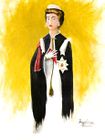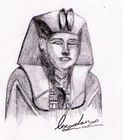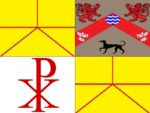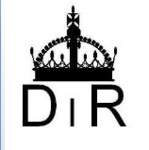Declan I, II & V
| His Royal and Imperial Majesty Declan I, II & V Ptolemy I Helios | |||||
|---|---|---|---|---|---|
| Emperor of Austenasia; King of New Wessex; King of Wilcsland, Taklamacan and Corran; King of Thebes; King of Saqqara | |||||
 Declan I, II & V in January 2012. | |||||
| King of Wilcsland, Taklamacan and Corran (Pharaoh) | |||||
| Reign | 1 May 2002 – 31 December 2014 | ||||
| Preceded by | Throne established | ||||
| Successor | Ptolemy II | ||||
| 3rd Emperor of Austenasia | |||||
| Reign | 19 December 2010 – 20 January 2013 (alongside Esmond III until 20 Sep 2011) | ||||
| Preceeded by | HIM Emperor Esmond III | ||||
| Succeeded by | HIM Emperor Jonathan I | ||||
| King of New Wessex | |||||
| Reign | 14 January 2012 – 1 December 2014 | ||||
| Preceeded by | Himself (as King of Wilcsland and Tsar of Orly) | ||||
| Succeeded by | New Wessex dissolved | ||||
| Fifth Midget Master | |||||
| Reign | 16 December 2010 – 20 January 2013 | ||||
| Preceeded by | Midget Fuhrer Thomas IV | ||||
| Succeeded by | Midget Master Jonathan II & VI | ||||
| Born | 20 May 1994 Wilton | ||||
| |||||
| House | Mac Donnchadha-Houghton | ||||
| Monuments | |||||
Declan I, II & V[1] (born Declan Christopher Blayney, 20 May 1994) - also known as Ptolemy I Helios in Wilcsland and by various other regnal names (see below) elsewhere - is the head and founder of the House of Mac Donnchadha-Houghton, and reigned as King of Wilcsland (and its predecessor states) between 2002 and 2014, and as Emperor of Austenasia between 2010 and 2013.
The son of Queen Michelle the Queen Mother and grandson of Princess Marjorie, Duchess of Corran, Declan became leader of the Chiefdom of the Sun in 1999, overseeing its conquest of the surrounding tribes and its transformation into the Kingdom of South Bank in 2002. With Declan remaining its only monarch, this kingdom eventually developed into the Kingdom of the Taklamacan in 2005, which was merged in March 2010 with the independent states (also founded and ruled by Declan) of Moylurg and Corran to form the Empire of Moylurg. In November later that year, Moylurg transitioned into the Kingdom of Wilcsland, which Declan reigned over until he was deposed by his brother on 31 December 2014.
In 2010, Declan began to focus effort on foreign affairs, with an aim of acquiring foreign thrones. By exploiting tensions between the then Emperor Esmond III and Crown Prince Jonathan of the Empire of Austenasia, he was able to have himself appointed co-Emperor of the nation in December 2010. Throughout 2011, Declan increased his influence in Austenasia and the surrounding Carshalton Nations, becoming sole Emperor, and in January 2012 declaring a political union between Wilcsland and the Carshaltonian nation of Orly as the United Kingdom of New Wessex.
The reign of Declan I within the Carshalton Nations has a controversial legacy. He is the only Emperor of Austenasia to have not once set foot in the Empire, instead ruling via the internet from his home kingdom of Wilcsland (of which many suspect he saw Austenasia as little more than a vassal), and intentionally encouraged an absolutist view of his reign. However, his remote rule from online laid much of the logistical groundwork for the reign of his successor in Austenasia, Jonathan I, who inherited an Empire which would soon administer claims from around the world.
Declan is known for having held a large number of thrones and titles during 2012, peaking at eleven (New Wessex, Wilcsland, Orly, Thebes, Austenasia, Rushymia, the Midgets, Southern Burkland, Amager, Erauqs, and New Balland) simultaneously held thrones in the short period between 26 April and 15 May. His abdication from the Austenasian Throne in January 2013 resulted in the rapid loss of his influence abroad, climaxing in the Liberation of Orly in June 2013 and his subsequent complete withdrawal from foreign affairs and eventual abandoning of Wilcsland itself.
Early life

Declan was born at 02:40 on 20 May 1994 at Salisbury District Hospital in Salisbury, England, as the son of Michelle MacDonagh and Keith Blayney. He had a fairly upsetting first few years, marked by such events as the death of his grandfather, which happened in front of him when he was three. He also sliced his head open when he was two after falling through glass, after which he was rushed to Salisbury District Hospital. When he was four, he gained an interest in the RMS Titanic and its sinking.
As he was growing up he became interested in history and art. He continued to have problems with horrific outcomes, such as nearly drowning in the sea off of the south coast of England. He attended two first schools and then Wilton Middle School, where he started to learn about buildings and bridges. He also suffered several physical attacks, in one case being attacked with a screwdriver.
Interests
Declan has a very deep interest in the ancient world and different cultures. His first really deep interest was in the RMS Titanic, which later evolved into ocean liners and air liners. His Majesty has also developed an interest in physics. He finds the way the universe works fantastic, and is deeply interested by things like pulsars, magnetars, and other "freaks" of space. He is also deeply interested in realistic space travel.
He is known to be seen reading through books on all of these subjects, and many of the projects of Wilcsland have been inspired by physics, art, and the ancient world.
Reigns
South Bank
By 1998, Declan was a member of the Chiefdom of the Sun, one of many small local tribes. When Chief Temecbo abdicated in 1999, Declan (as the next-highest-ranking member of the tribe) became the new Chieften. Taking the regnal name of Chieften Nectombetec II, he led the Chiefdom of the Sun in conquering and subduing all the neighbouring tribes, most notably the Chiefdom of the Moon and the Eastern Chiefdom. By the end of the year, each of the neighbouring chiefdoms had been conquered by Nectombetec II, and he assumed the title of Great Chieften (which had only been held once before, roughly four years earlier by the namesake of Nectombetec II).
By 2002 the conquered chiefdoms had been integrated into the Chiefdom of the Sun securely enough for Nectombetec II to declare a full and equal political union. On 1 May 2002, all of the chiefdoms were united into the Kingdom of South Bank. Nectombetec II was proclaimed King Declan I, crowned with a crude coronet of cardboard and sequins, and given a simple flail as a symbol of royal power.
The month after Declan I was proclaimed King of South Bank, an usurper took over the northern half of South Bank. Olcut III (leader of the Chiefdom of the Moon when Declan I had conquered it) declared himself King Barry I, the new leader of South Bank, and started a civil war against King Declan I. The usurpation only lasted a few days before Declan I retook the north of South Bank and defeated Barry I.
With a greater hold on power, Declan I began to send out expeditions to other local groups of people, collectively known as the "Kingdom of North Bank", and after inviting their leaders to South Bank (one of which even claimed the rank of King) sent them back to set up South Bankian outposts in their own lands.
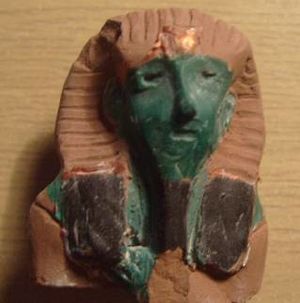
Forgotten Realms
In 2003, South Bank was forced to move from its original location. Most of the nation moved with Declan I to the Forgotten Realms, where he founded the Kingdom of Atlantis on 20 September as the successor state to South Bank.
A month after this, King Declan I also founded the Kingdom of Saqqara as a client state to Atlantis, and installed John I of Saqqara a vassal king. Around the same time as this, the Kingdom of Thebes was founded nearby by King Kieran I, a rival of Declan. Conflicts broke out between Saqqara and Thebes, and Declan personally took over the throne of Saqqara to more closely oversee the war. While Declan was in Saqqara however, Kieran invaded Atlantis and occupied the capital, Atlantos. Declan retook the capital and two days later led a combined Saqqaran and Atlantean army against the forces of Thebes. After personally defeating Kieran in direct combat, Declan I defeated the Theban army. Kieran I & I was deposed, and Declan became King Declan I & II of Thebes. All three kingdoms were now in personal union under Declan I.
When Declan I was unwell for a week in 2004, he left control of Atlantis to the head of the military, Daniel Penny, who unofficially reigned as King Daniel I until Declan I returned and peacefully retook power. 2004 also saw Declan I being proclaimed President of the short-lived nation of Nineger, which dissolved the following year. Another notable incident to occur in 2004 was when a large storm hit the Forgotten Realms and the personal safety of Declan I was placed in danger as a tree in Thebes nearly fell on him.
The Forgotten Realms were abandoned in 2005, and the nations moved again, to a new location. Here, the Kingdom of Atlantis transitioned into the Kingdom of the Taklamacan.
Since the kingdoms moved, Declan has twice given away the throne of Thebes. In March 2010, he crowned his brother (the now Ptolemy II) King Ciaran II & III of Thebes before taking back the throne for himself in May of that year, and in December he appointed another monarch, King James I & IV, who reigned until February 2011 when Declan once more took back the throne for himself. Despite Thebes being later annexed by Wilcsland, Declan continued to hold the title King of Thebes as a ceremonial position until he was deposed by his brother.
Taklamacan
In October 2005, Declan I moved with the kingdoms away from the Forgotten Realms and to a new location, where Atlantis was re-founded as the Kingdom of the Taklamacan. For its first few months, the Kingdom of the Taklamacan was a thriving centre of art and creation, despite having to fight off attacks from a nearby people (referred to as "barbarians") from its very beginning. The Papacy of the Proto-Cults was established by Declan I, and the Taklamacan prospered.
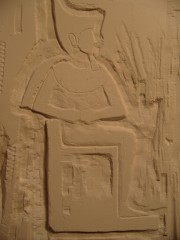
However, before long a civil war broke out when Alexander I of the Taklamacan declared himself King in opposition to Declan I. Alexander I was defeated, but the brief civil conflict resulted in a large decrease in the cultural art of the Taklamacan being produced, and foreshadowed a long period of political instability. Near to the end of 2005, Pope Alexander I plotted to seize the throne from Declan I and crown himself Alexander II & I - his plot failed when Declan I was shown a letter from Pope Alexander I written to another conspirator, which detailed the plot. Declan I deposed Alexander from the papacy and appointed Pope Marcus I in his place.
The cultural decline of the Taklamacan and the barbarian attacks continued, and in the summer of 2006, Joshua I of the Taklamacan seized the throne and deposed Declan I by bribing citizens and exploiting their fears about the current turmoil.
The incompetent leadership of Joshua I during a time of such crisis led to the Taklamacanian outposts declaring independence and the northern part of the Kingdom being conquered by barbarians. With the main sources of the Kingdom's resources cut off, the societal and cultural decline of the Taklamacan greatly accelerated.
Declan had gone into exile to the southern, sandy regions of the Taklamacan and had been leading an insurgency against Joshua, indirectly aiding the barbarian attackers as Joshua's army was stretched to breaking point trying to deal with both threats to his throne. Declan and his supporters constructed a weapon that catapulted large quantities of dust and sand at the capital of the Taklamacan, making things even more difficult for Joshua. By the end of a single week of his rule, the Taklamacanian people overthrew Joshua and invited back Declan, re-enthroning him as King of the Taklamacan. By this point, however, the Taklamacan had all but collapsed, and the authority of the King was incredibly weak.
It was thought impossible that the situation could get worse, but it did - yet another usurper, Joshua II, managed to seize power over half of what was left the kingdom and a civil war began between himself and King Declan. After a brief period of warfare, Joshua II abdicated and the entire kingdom once more fell under the rule of Declan I - by now however, the damage done to the Taklamacan was irreparable, and the kingdom fell into a dark age.
In late 2007, Declan I was re-crowned King of the Taklamacan, and began a renewed attempt at restoring the former greatness of the kingdom. Outposts and military bases were established, the full authority of the monarch was restored, and the Taklamacan began to thrive again. After a few years, in 2009, the Kingdom of Moylurg was created by Declan I, and the Taklamacan became a Moylurgian Commonwealth Realm along with the Kingdom of Corran. On 7 March 2010, Declan I united the Taklamacan with Moylurg and Corran into the Empire of Moylurg, and is therefore now part of the present-day Kingdom of Wilcsland.
Moylurg and Corran
On 11 June 2009, Declan I founded the Kingdom of Moylurg. This was also known as the Kingdom of Deleckshum at the time, and Declan claimed both Emperor of Deleckshum and King of Moylurg as his titles. On 10 July 2009, Declan appointed for the first time a co-monarch to rule alongside him. He gave Frances I the title Empress of Deleckshum, and she became his co-ruler. On 11 September 2009, she was given another title, Queen-Regent of Moylurg. She ruled alongside Declan until 13 October 2009, when she left Moylurg and he removed her from power. It was also on this date that the separate throne of Deleckshum was abolished and merged into that of Moylurg.

Around this time, Declan I assumed the throne of Corran. This was one of the outposts originally founded by Declan in 2005 to supply the Taklamacan with resources, but had declared independence during the reign of Joshua I or in the chaos that the kingdom suffered for about a year after his reign. Declan sent a vassal monarch to retake Corran, and the sending of resources began again, helping to build the resurgent Taklamacan. In October 2009, Declan deposed the vassal monarch and became King of Corran.
Around this time, the Kingdom of the Taklamacan and the Kingdom of Corran became Moylurgian Commonwealth Realms - instead of ruling from Taklamacan, the direct successor state of South Bank, Declan I now ruled from his new realm of Moylurg. Along with Saqqara and Thebes, Declan gave Corran and the Taklamacan the status of "subkingdoms", further establishing that all of his lands were subservient to the Kingdom of Moylurg.
Some time in early 2010, the throne of Declan I was threatened by the former Pope Alexander I - now the representative of the Moylurgian king in the Taklamacan, he once more planned to install himself as King Alexander II & I, but his plot again failed. Declan confronted Alexander, and the two reached a compromise whereby Alexander was given the title Earl of the Taklamacan.
On 9 February 2010, Declan I appointed another co-monarch. Laura I was proclaimed Queen-Regent of Moylurg and Corran, and ruled alongside Declan I until 1 May, when she was deposed for speaking to him in a manner that he deemed inappropriate. A month after Laura's appointment, on 7 March 2010, Declan I united the Taklamacan and Corran with Moylurg, founding the Empire of Moylurg as a political union between his three main kingdoms and assuming the title Emperor of Moylurg and the regnal name of King Tanwetamani. The Empire of Moylurg was renamed back to the Kingdom of Moylurg the following month, but the Taklamacan and Corran still remained inferior to and politically united with Moylurg. Tanwetamani changed his regnal name back to Declan I, and his title Emperor of Moylurg to King of Moylurg, Taklamacan and Corran.
Starting at roughly the same time that Laura I was removed from power, Moylurg entered its Fourth Intermediate Period. Declan I began to focus more on foreign than on domestic affairs, and started to become inactive in governing Moylurg itself. The population began to decrease, and King Declan's power with it. Declan I raised taxes to get materials for a new capital of Moylurg, and ordered a pottery to be built to create new objects for the kingdom. The population began to rise again but the nation was still not as stable as it had been before.
On 19 October 2010, Declan I appointed the then Crown Prince Jonathan of Austenasia the latest co-ruler of Moylurg. Unlike all previous co-rulers however, who had always had their title end in "-Regent", the title of Jonathan I was simply King, implying full and equal power alongside Declan I (although in practise, the rule of Jonathan I was merely ceremonial). On 10 November, a large meeting of the Moylurgian population was gathered, almost a national assembly. The people voted for several changes to Moylurg - the most notable were that Jonathan I as a foreigner would be removed from the throne (Declan I compensated him with the title Duke of Atlantos), and that the Kingdom of Moylurg would be re-founded into the Kingdom of Wilcsland.
Wilcsland
On 10 November 2010, the Moylurgian people gathered and declared the founding of a new successor nation, the Kingdom of Wilcsland. Declan I took the throne as sole King of Wilcsland, Taklamacan and Corran, and a week later appointed Frances I again to the position of Queen-Regent.
From February 2011, Declan I began to make the Kingdom of Wilcsland more and more similar to Ptolemaic Egypt. Although Moylurg and its predecessor states were always heavily influenced by ancient Egyptian culture, on 15 February 2011 a proclamation was made by Declan I that he would from then on rule in Wilcsland as King Ptolemy I Helios, and that Frances I would assume the new regnal name of Arsinoe I Selene. Since then, Declan and his co-rulers claimed the rank of Pharaoh, although their official titles remained King or Queen.
Later on the same day that Ptolemy I decreed his change in regnal name, he deposed Arsinoe I from the position of Queen-Regent, and replaced her with his brother, giving him the regnal name of Ptolemy II Alexander II and so appointing a King-Regent for the first time in Wilcsland's history (although King Jonathan I had been titular co-ruler over Moylurg, he was never referred to as holding any other title than that of a full King).
The Kingdom of Wilcsland would see three more co-rulers appointed within the space of a week, primarily so that Declan's co-rulers could have regnal ordinals suggestive of a prestigious history. The day after Ptolemy II took the throne, he was deposed and Berenice I was appointed Queen-Regent in his place. Her reign as Queen-Regent of Wilcsland was one of the shortest of any monarch in history, as within a few hours she had also been deposed by Ptolemy I, who appointed Arsinoe II Cleopatra the new Queen-Regent. Her reign lasted a little longer, five days, before she in turn was deposed and replaced as co-ruler by Ptolemy III Helios II. This new King-Regent was deposed on 12 March 2011; Ptolemy I appointed no further co-rulers for Wilcsland except his mother as Arsinoe III for four days at the end of August later that year.
Carshalton Nations
Copan and Orly
Beginning in May 2010, Declan I became a close friend of Crown Prince Jonathan, the then Prime Minister and Heir to the Throne of the Empire of Austenasia.
In July 2010, the Caesarship of Orly was founded. A Declaration of Independence was written by some frequent users of a British park near Austenasia, who asked Esmond III, Emperor of Austenasia, to appoint a leader for them. He chose HIH Caesar Calum as the leader of Orly, who later that month decided to split Orly in two - the Kingdom of the Grove and the Kingdom of Copan, two separate Kingdoms. If the throne of either became empty, the other King would act as Regent until the Emperor of Austenasia could appoint a new King. Calum I became King of the Grove, and looked for a leader for Copan. Crown Prince Jonathan suggested that Declan I be made King of Copan, and Calum agreed, Declan I being declared King of Copan on 19 July and Crown Prince Jonathan ruling as Viceroy in his absence.
A few weeks after this, Declan I met the Crown Prince in person. Crown Prince Jonathan visited Moylurg on a state visit, having been given ambassadorial powers by the other Carshalton Nations and representing Austenasia, the Grove, and the Midget Nation-in-Exile. Declan I (representing Moylurg and Copan) signed the Treaty of Wilton with him, promising mutual recognition and non-aggression between all five nations, allying Moylurg with Austenasia, and allying Copan with the Grove and the Midget Nation.
Another meeting between the two national leaders was held on 25 September 2010 in the British town of Basingstoke, further strengthening the alliance between Moylurg and Austenasia. On 12 November 2010, Emperor Esmond III of Austenasia deposed Calum I from the throne of the Grove and appointed Crown Prince Jonathan in his place, naming him Lord Regent of the Grove. Crown Prince Jonathan abdicated from this position on 8 December 2010, allowing Declan I to become Regent of the Grove until the Emperor could appoint a new ruler. Declan I did not give Esmond III a chance to, however - after a mere four minutes as Regent, Declan I decreed that the Grove and Copan were henceforth reunified, and declared the foundation of the "Tsardom of Orly". Making the whole of Orly a vassal state of Wilcsland, he named himself Tsar and gave his Wilcslandian co-ruler Frances I the position of Tsarina.
War of the Orlian Reunification
Once the Emperor learned that Orly had re-unified, on 9 December he demanded to be allowed to carry out his right to choose a new leader for the Grove, as a Copanese regency over the Grove was intended to be temporary. Declan refused, and rejected the Emperor's claim to suzerainty over Orly which had been maintained in the Grove under King Calum. The Emperor, as King of Rushymia, declared a symbolic state of war between Rushymia and Orly as a sign of his displeasure, Rushymia being a completely titular nation with no population.
Later that day however, the Midget Nation-in-Exile (who had been allied with Copan and the Grove and were therefore allied with the newly re-unified Orly) declared war on Rushymia in defence of Orly. Midget Fuhrer Thomas IV surprisingly also threatened Austenasia - since March 2010 the Midget Nation had been practically an Austenasian vassal. In light of these threats, and due to the fact that as Rushymia has no sovereign land, Austenasia would most likely be attacked in the event of an Orlian or Midget invasion, the Empire declared war on Orly and the Midget Nation on 10 December. The Midget Army, once it became aware that Thomas IV was subordinate to Declan in the Orlian side of belligerents, decided to depose Thomas IV and proclaimed Declan I to be the Fifth Midget Master on 16 December. Declan kept Thomas as Midget Fuhrer, to act as his viceroy over the Midget Army.
On 19 December, Crown Prince Jonathan surrendered Wrythe, the capital of Austenasia, to the threat of a Midget invasion and wrote up an Act of Parliament ending the war and declaring Declan I, II & V to be joint Emperor of Austenasia and joint King of Rushymia (the titular throne of Rushymia being held ex officio by the Emperor of Austenasia). Since Austenasia had been under a State of Emergency since the war was declared, the signatures of three Counsellors of State were all that were needed to make the Act law - Vicereine Margaret and Princess Caroline both signed the Act along with Crown Prince Jonathan, and HIM Emperor Declan I became co-Monarch.
It was revealed a year later that the events of December 2010 had been almost entirely orchestrated by Crown Prince Jonathan, who had successfully aimed to install Declan as co-Emperor in order to counterbalance the influence of Esmond after the latter had began to make plans to overthrow the constitutional monarchy of Austenasia. Declan had encouraged Jonathan to take this course of action instead of any other possible contingency plans, and had been fully aware of the true nature of events.
Post-war
After the War of the Orlian Reunification, it was made clear that Orly was a mere vassal state of Wilcsland. As Arsinoe I was deposed from the Wilcslandian throne and replaced by Ptolemy II Alexander II, the same thing happened to the throne of Orly. Co-rulers of Wilcsland were automatically made co-rulers of Orly, although the system of regnal numbering was slightly different. For example, Declan I only declared that he would be known as Ptolemy I Helios in Wilcsland - in Orly he was still regarded as Declan I, and Orly never had an Alexander I, so Ptolemy II Alexander II was known there as Ptolemy I Alexander - Ptolemy III Helios II was therefore known as Ptolemy II Helios. The Orlians only used one monarchical ordinal (after the first regnal name of the monarch), and as with the regnal name of Declan I, regarded Arsinoe I Selene of Wilcsland to be Frances I of Orly, therefore meaning that Arsinoe II Cleopatra I was known there as Arsinoe I Cleopatra.

In Austenasia, Declan I ordered that the Austenasian Army be reformed - this it was, into a fighting force based more on ancient Roman legions than on modern British regiments and battalions. On 31 March 2011, the Parliament of Austenasia voted to remove Esmond III from all his powers with a Vote of No Confidence, leaving Declan I as the only Emperor of Austenasia with any powers. On 9 April 2011, Declan gave Imperial Consent to an Austenasian Act of Parliament that unified the Midget Nation-in-Exile into the Empire of Austenasia. The title and office of Midget Master was unified with the Austenasian Throne, the Midget Army became a military unit in the Austenasian Army, and the independent government of the Nation-in-Exile was dissolved. On 20 September, the Austenasian Constitution of 2011 came into force. This removed Esmond III from the position of Monarch, leaving Declan I as sole Emperor of Austenasia. The new constitution also significantly increased the powers of the Monarch. On 12 May the following year, he formally recognised his position as overlord of the Carshalton Nations by proclaiming himself Shahanshah of the Carshalton Realms to signify his position as monarch of Austenasia, Orly, Rushymia and the Midgets, and on 22 July became the longest reigning Emperor of Austenasia, beating the previous record of 581 days reigned by Esmond III.
Declan I abdicated from the Throne of Austenasia on 20 January 2013, and was succeeded by the Crown Prince, who ascended the Throne as HIM Emperor Jonathan I later that day. Due to the titles King of Rushymia and Midget Master having been unified with the Austenasian Throne, these also passed to Jonathan I upon Declan's abdication from Austenasia.
New Wessex
On 14 January 2012, Declan I declared the political union of the Kingdom of Wilcsland and the Tsardom of Orly as the United Kingdom of New Wessex. This followed several persistent calls from various national leaders such as James von Puchow for the nations of Declan I to be unified - Orly had already been in de facto real union with Wilcsland since its founding, as its monarchs were automatically the same as Wilcsland's.
While retaining the thrones of Wilcsland and of Orly, Declan founded a new throne of New Wessex, to which the former two became subordinate. The monarch of Orly was restyled from Tsar to King, as while the Tsar of Orly had been a vassal of the King of Wilcsland, it was considered inappropriate that a Tsar should be structurally subordinate to a King as part of New Wessex. The Kingdom of Thebes was also abolished as a subkingdom and fully merged into Wilcsland, with its royal title being retained by Declan as a purely ceremonial one.
Nine days after the founding of New Wessex, on 23 January, Declan I renamed the House of MacDonagh to the House of Mac Donnchadha-Houghton, utilising the Irish spelling of his mother's house and affixing the maiden name of his grandmother Princess Marjorie - Houghton - to the end.
In September 2012 that year, New Wessex acquired its first colony, New Wiltshire, in North America. On 19 November, a second colony by the name of New South Scotland was also annexed; situated in Australasia, this gave Declan an empire on which the sun never sets. New South Scotland was ceded with the consent of its governor to Austenasia upon Declan's abdication from the Empire in January 2013.
On 24 June 2013, discontent amongst the people of Orly at being ruled by a monarch who was no longer Emperor of Austenasia culminated in them declaring independence from New Wessex, restoring the independent kingdoms of the Grove and of Copan under Austenasian suzerainty. A few weeks later, on 12 July, New Wiltshire also declared independence from New Wessex. New Wessex was dissolved by Ptolemy II upon his accession to the Wilcslandian throne, being by then a "union" of Wilcsland alone.
Other nations

On 22 July 2010, Declan I was contacted by the leader of Etarnia, a nation of which little was (and is) known, and was offered the Etarnian throne. Declan accepted and became King of Etarnia, but roughly two months later rumours reached the King of some sort of revolution; Etarnia appeared to have transitioned into a Grand Duchy and deposed Declan, who sent a message asking for more information but never received a reply.
In early May 2011, Declan was again contacted: this time, by the monarch of Ctoria, the successor state of Etarnia. Negotiations began concerning the claim of Declan I to the now defunct throne of Etarnia. On 8 May, Declan was declared joint monarch of Ctoria, ruling alongside Julianne IV, and on 12 May the Ctorian title of Declan I was decided to be Kaiser. This nation turned out to be very weak, and collapsed on 2 October later that year, after Julianne IV unilaterally declared an ineffective transition into a "Victorian Confederation". As of 2013, Declan still claimed the title Kaiser of Ctoria.
On 29 January 2012, Declan I was given the throne of the Domanglian Federation after the former monarch, Ciprian of Juclandia, was deposed after the failure of a Theodorist revolution. He agreed to be removed from this throne on 14 February a few weeks later, as Domanglia underwent numerous reforms.
On 22 April 2012, Declan I was made both Doge of Amager and King of Southern Burkland, within the space of a few minutes, but lost the latter throne when Southern Burkland was dissolved on 5 August 2012. On 24 April, he was made titular King of Erauqs and Prince in Von Stergel by Erephisian founder Billy Neil, adopting the regnal name of William II for use in that nation (these titles became redundant upon the dissolution of Erephisia in mid-2016). Another two days after that, he became King of New Balland as the nation became an Austenasian Protectorate and adopted the Austenasian Monarch as its head of state, but lost this throne when the nation transitioned into Dakrit the following month. His Amatine position was renamed from Doge to Amaşemé on 17 November 2012, to Person of the Nation on 6 January 2013, and then to Steward of the Confederation on 12 January before being lost on 20 January when he abdicated from the Austenasian Throne, the Amagerian government having considered the two positions to be in real union.
Deposition
After the Liberation of Orly, Declan completely withdrew from foreign affairs and also became inactive in governing Wilcsland, the one realm he still had. By November 2014, Declan had moved away from Wilton to London, cutting off contact with his citizens. On 31 December 2014, Declan's brother Ciaran declared himself the new King of Wilcsland as King Ptolemy II, deposing Declan from the throne.
Gallery of artwork
Declan is well-known for his artwork, having created and published a number of drawings and paintings, many of them portraits.
-
A portrait of Princess Michelle of Wilcsland, 2011.
-
A picture of King Barry I of South Bank, 2010/11.
-
A picture of Pope Alexander I, 2010/11.
-
A portrait of Queen Frances I of Moylurg and Wilcsland, 2010.
-
A picture of King John I of Saqqara, 2010.
-
A portrait of Queen Frances I of Moylurg, 2010.
-
A portrait of Queen Elizabeth II of the United Kingdom, 2010.
-
A painting of Queen Elizabeth II of the United Kingdom, 2011.
-
A self-portrait, 2010.
-
A portrait of Princess Michelle of Wilcsland, 2011.
-
A picture of a King of Kush, 2010.
-
A self-portrait. 2010.
Titles, styles and arms
| ||||||||||||
| Royal Family of Wilcsland |
|---|
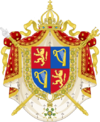 |
It is unknown what title and style Declan has used or claimed since being deposed from the throne of Wilcsland. He may use Kaiser Declan I as pretender to the throne of Ctoria, Lord Declan, Count of Borken as Count of Borken,[2] or Sir Declan Mac Donnchadha-Houghton, KOSE, KCCL as a Knight of the Order of the Sovereign Eagle and Knight Companion of the Community of Landashir.
Used in international relations
- 1999 - 1 May 2002: HM Chieften Nectombetec II
- 1 May 2002 - 7 March 2010: HM King Declan I
- 7 March 2010 - April 2010: HIM King Tanwetamani
- April 2010 - 8 December 2010: HM King Declan I
- 8 December 2010 - 16 December 2010: HR&IM King-Tsar Declan I
- 16 December 2010 - 19 December 2010: HR&IM King-Tsar Declan I & V
- 19 December 2010 - 14 January 2012: HR&IM King-Tsar-Emperor Declan I, II & V
- 14 January 2012 - 20 January 2013: HR&IM King-Kaiser-Emperor Declan I, II & V
- 20 January 2013 - 31 December 2014: HM King-Kaiser Declan I & II
Used in Wilcsland and its immediate predecessor states
- 1999 - 1 May 2002: HM Chieften Nectombetec II
- 1 May 2002 - 7 March 2010: HM King Declan I
- 2009 - 2010: King Lion (alternative Corranese regnal name)
- 7 March 2010 - April 2010: HIM King Tanwetamani
- April 2010 - 15 February 2011: HM King Declan I
- 15 February 2011 - 31 December 2014: HM King Ptolemy I Helios
Used in Orly and Copan
- 19 July 2010 - 8 December 2010: HM King Declan I
- 8 December 2010 - 14 January 2012: HIM Tsar Declan I
- 14 January 2012 - 24 June 2013: HM King Declan I
Used in New Wessex
- 14 January 2012 - 31 December 2014: HM King Declan I
Used in Austenasia
- 19 December 2010 - 20 January 2013: HIM Emperor Declan I
Arms
Declan I used the Royal Standard of New Wessex (and formerly the Imperial Standard of Austenasia) as his personal heraldic banner. He also had a royal and imperial cypher representing him as an individual, used when he was both King and Emperor.
-
The Royal Standard of New Wessex, adopted in October 2012.
-
The Imperial Standard of Austenasia, adopted in July 2011.
-
The royal and imperial cypher of Declan I, II & V, adopted in June 2012.
-
A cypher unofficially used to represent Declan I as King of Moylurg and later as King of Wilcsland between August 2010 and June 2012.
Ancestry
| Ancestors of Declan I, II & V | ||||||||||||||||||||||||||||||||||||||||||||||||||||||||||||||||||||||||||||||||||||||||||||||||||||||||||||||||||||||||||||||||||||||||||||||||||||||||||||||||||||||||||||||||||||||||||||||||||||||||||||||||||||||||||||||||||||||||||||||||||||||||||||||||||||||||||||||||||||||||||||||||||||||||||||||||||||||||||||||||||||||||||||||||||||||||||||||||||||||||||||||||||
|---|---|---|---|---|---|---|---|---|---|---|---|---|---|---|---|---|---|---|---|---|---|---|---|---|---|---|---|---|---|---|---|---|---|---|---|---|---|---|---|---|---|---|---|---|---|---|---|---|---|---|---|---|---|---|---|---|---|---|---|---|---|---|---|---|---|---|---|---|---|---|---|---|---|---|---|---|---|---|---|---|---|---|---|---|---|---|---|---|---|---|---|---|---|---|---|---|---|---|---|---|---|---|---|---|---|---|---|---|---|---|---|---|---|---|---|---|---|---|---|---|---|---|---|---|---|---|---|---|---|---|---|---|---|---|---|---|---|---|---|---|---|---|---|---|---|---|---|---|---|---|---|---|---|---|---|---|---|---|---|---|---|---|---|---|---|---|---|---|---|---|---|---|---|---|---|---|---|---|---|---|---|---|---|---|---|---|---|---|---|---|---|---|---|---|---|---|---|---|---|---|---|---|---|---|---|---|---|---|---|---|---|---|---|---|---|---|---|---|---|---|---|---|---|---|---|---|---|---|---|---|---|---|---|---|---|---|---|---|---|---|---|---|---|---|---|---|---|---|---|---|---|---|---|---|---|---|---|---|---|---|---|---|---|---|---|---|---|---|---|---|---|---|---|---|---|---|---|---|---|---|---|---|---|---|---|---|---|---|---|---|---|---|---|---|---|---|---|---|---|---|---|---|---|---|---|---|---|---|---|---|---|---|---|---|---|---|---|---|---|---|---|---|---|---|---|---|---|---|---|---|---|---|---|---|---|---|---|---|---|---|---|---|---|---|---|---|---|---|---|---|---|---|---|---|---|---|---|---|---|---|---|---|---|---|---|---|---|---|---|---|
| ||||||||||||||||||||||||||||||||||||||||||||||||||||||||||||||||||||||||||||||||||||||||||||||||||||||||||||||||||||||||||||||||||||||||||||||||||||||||||||||||||||||||||||||||||||||||||||||||||||||||||||||||||||||||||||||||||||||||||||||||||||||||||||||||||||||||||||||||||||||||||||||||||||||||||||||||||||||||||||||||||||||||||||||||||||||||||||||||||||||||||||||||||
Awards and decorations
 Knight Protector of the Crown Prince, 4 May 2010 – 20 January 2013
Knight Protector of the Crown Prince, 4 May 2010 – 20 January 2013 Knight of the Order of the Sovereign Eagle, Second Class, 9 October 2010
Knight of the Order of the Sovereign Eagle, Second Class, 9 October 2010 Knight of Honour in the Glorious Order of St. John, 18 September – 19 December 2010
Knight of Honour in the Glorious Order of St. John, 18 September – 19 December 2010 Lord of the Royal Order of St. Christopher, 20 December 2020
Lord of the Royal Order of St. Christopher, 20 December 2020 Ribbon of Flora, 21 April 2011
Ribbon of Flora, 21 April 2011 Companion of the Community of Landashir, 3 January 2012
Companion of the Community of Landashir, 3 January 2012Order of Plum Flower, 4 May 2012
 Order of the Trout, 30 December 2012
Order of the Trout, 30 December 2012
| Preceded by: Esmond III |
Longest reigned Monarch of Austenasia 22 July 2012 - 22 February 2015 |
Succeeded by: Jonathan I |
Notes
- ↑ Declan I, II & V was the second monarch to have ruled over Thebes (not counting subsequent non-consecutive reigns) and was the fifth to have ruled over the Midget Nation-in-Exile. In keeping with the customs of these two nations, he therefore used the ordinals of II and V along with that of I (which was used for the obvious reason of being the first of his name to rule over his nations). That of II was also used due to his titular throne of Erauqs, having taken the regnal name of William II.
- ↑ The title "Count of Borken" was granted to Declan by Sebastian I during his short reign as German Emperor.







